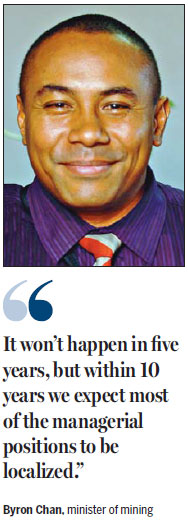PNG seeks partners to build refineries
In an interview, Byron Chan, minister of mining of Papua New Guinea, talks about new opportunities in the country's mining sector.
Thanks to huge surges in foreign investment - particularly a $19 billion payout by Exxon-Mobil - Papua New Guinea's resources are finally being exploited to help the country develop. How did the government enable this?
We made some compromises in terms of benefits and taxes but the overall benefit of the investment outweighs all the immediate tax incentives that the government had to give away in turn to get this investment in.
Papua New Guinea has been lucky to have Exxon Mobil invest in its own backyard, and make the LNG project become a reality. The growth associated with that and the stability of the local currency have been phenomenal.
In terms of mining, major companies such as Lihir reinvested almost $1.5 billion to increase its gold production up from 800,000 ounces (22,679.6 kilograms) to 1 million ounces. The estimated lifespan for this is about 30 years, so that was a significant investment.
The Simberi mine also increased production from about 100,000 ounces of gold up to 200,000. They have made improvements in the plant, so investment in increasing the production of gold grew significantly -almost about $2 billion I would say. This also contributed to the 8 percent increase over the past couple of years that it maintained.
Everything has slowed down now in terms of LNG so the gold mines are ready to go into production.
On the exploration front, what new projects are coming on stream and what are your expectations for these projects?
There are several major mines that we are investigating. The first one is a gold mine in the Milne Bay area that we expect to have 10 years' production.

Next, there is the Yandera Copper mine in Madang province, which is being operated by Marengo. Marengo is a Canadian-registered company, but they have got significant Chinese investors in there, so that will be a boost for PNG-China cooperation.
The Ramu Nico nickel project took off slowly, but I am sure it will be successful, because the systems and technology they have put in place are pretty high-tech and pretty new, so everyone's getting used to it.
We have another one, owned by Pan Australia, called Frieda River. Frieda River has significant findings of copper and the fourth would be Wafi-Golpu, which is a South African-Australian investment. The fifth would be Mount Kare, a possible gold mine. So they are the more advanced projects that we are looking in.
If the three copper mines develop as we hope, they should put PNG up to a premier start in copper exporting. We would like to be number one in gold and copper. We know we have the resources, thanks to the assistance of the World Bank who funded a geothermal survey of our island.
And we know that there are a lot of minerals. We have highly mineralized areas, and there are over 600 licenses, exploration licenses now. People are out there drilling, trying to establish the fact that we have minerals and we do have. Everywhere that you drill, you will find that there is something. Whether it's rare earth or copper or gold, you will find something.
Over 300 companies are exploring up to 300 sites, both locals and Australian, Canadian, the English are here as well. It's pretty competitive right now. We have five advance projects and if we develop those ones, we will be among the top-five gold exporters in the world.
What we would like to achieve is to go into more downstream processing of these minerals. We just don't want to export all of our resources. What we want to capture is the high value of this resource and keep those revenues in our country and create employment.
There are skills that are required to get those projects, skills transfer, I suppose you could say. Capacity-building of our people, which is not there if everything is exported. So if we can have the opportunity to develop copper refinery, gold refinery and cement refinery, also metals refinery.
We have a lot of minerals - we have everything here except the refineries and the know-how. Obviously, it won't happen in five years, but within 10 years, we expect most of the managerial positions to be localized. China has the capacity right now to help us. We can look at joint ventures to develop this industry, downstream processing, refineries. I'm looking for partners right now to help us establish our refineries.
InFocus provided this story.
(China Daily 06/29/2015 page20)








